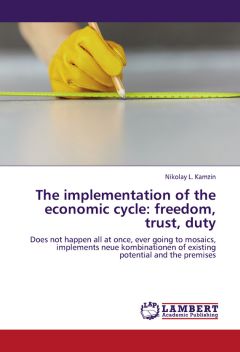Most of the complexity of the relationship are dispositive, folding, when equal entities shall cooperate on a voluntary mutual benefit, they are in the regulatory framework established by the ability to negotiate, to dialogue and reach a balanced conclusion as a result of negotiations.
So, consider the following situation. There is a subject which has the ability to provide goods or services, and the subject in need of this product or service, they know about each other, but still were in direct interaction and, consequently, the reputation of each other can only bring «outside help».
Risks in collaboration missing, as Homer wrote «dangerous maneuvering between rocks»[82] is present on this side and on the other hand, reached an agreement on price, product, date, it remains to solve the issue of making payments, how to organize calculations for specificity has led to what we have deal with the goods.
Options to address the issue:
– due to the fact that the subject goods has wished to implement it, and found a potential buyer one of the most simple solution is to supply the goods and pay the agreed price by bank transfer to the buyer's account to the seller. With such an arrangement at once manifested payment risk, for various reasons, the same output will only further costly legal collection formed the debt;
– if the volume of supplies divided into parties and payments, respectively, and divided into tranches, we can carry out periodic monitoring of the implementation of mutual commitments and control each other spending estimates in the form of an open account. The buyer receives the shipment after receiving the proceeds from its sale, or receipt of funds from the use of the goods in neue kombinationen takes payment and so on until the execution of mutual agreement in full;
– the concept of professional, expert testifies to the possession of the subject of theoretical knowledge and practical skills, that is, he goes in a certain area. In economic relations, the seller arranges for its own convenience, automation of the sales process «fork intermediaries» which communicates with the outside world and it is, except for access to a significant flow of external agents to me. Because a network of dealers is selling goods to buyers. In this scheme of cooperation buyer may cast doubt on whether the goods from the seller and its insurance, risk minimization, may insist on payments in the form of a documentary collection, that is, the seller will carry the shipment of goods from the warehouse, to delivery to the conditioned space, and receive payment for goods in based on this fact confirming documents. Significant risk of the seller under this assumption is that the buyer may refuse to purchase.
The solution to minimize this risk, the author's opinion, may be costing and losses from the performance of obligations of the seller to the buyer. The buyer would have brought as a deposit (Art. 380, 381 of the Civil Code)[83]. Thus the buyer would affirm its intention to purchase goods and to «insure» against improper performance of an obligation to deliver the goods by the seller;
– if confidence in the uniqueness of its product and doubts about the solvency of the buyer, the seller is willing to provide warranty receipt of payment for goods and insisting on payment in the form of a letter of credit, so the buyer or their own, or borrowed money used to open letters of credit, what makes sure the seller and ships the goods, due to the Credit provides a package of documents to the bank and get cash, goods and the buyer.
Credit institutions (banks) involved in the calculations as operators (agents) are professional intermediaries in monetary engaged in banking operations, the remuneration for the performance of which is one of the articles of their income as «burdening the activity of a person obliges him to compensate for time spent and strength»[84].
To increase their competitiveness and attractiveness, credit institutions form a network of branches and representative offices, is one of the options for resolving the issue. Another is the result of the expression «do not have a hundred rubles, and a hundred friends» through the establishment of correspondent relations and opening of accounts Loro and Nostro lenders time keeping remains at the required volumes, can meet the customer need to transfer funds within the framework of international economic cooperation in light of its of interest. However, one should consider the risks of interbank loans, the level of which is usually lower than on loans to customers[85].
For the calculation of commercial banks – one of the main areas of activity[86]. Development of International Settlements is the ratio of static models taken from the overall dynamics of the use of tools and execution of financial obligations in the framework of international economic cooperation.
Payment method is a method of performance, and its choice depends on several factors caused, first of all the aspirations of the parties and their level of interaction. In mathematical science is the concept of «+» infinity and «-» infinity, which are impossible to achieve the aspiration of a point. In organizing the settlement of relations among the parties such aspirations. At the same psychology of their actions is as follows.
The motive for the entry into the relationship and the cause of their activity is originated and unmet need. One side needs to be in the product or service, and another, being able to provide a service or product having wished to implement their own capacity for adequate compensation, and preferably in the form of «silver, which goes from the merchants»[87] accounting currency. Although depending on the arrangements and the needs of the parties in practice meets the set of combinations of forms of payment. However, the essence remains the same one of the parties expects the execution of financial obligations, and agrees to comply with it is different with the appropriate correspondence.
Credit institutions which are the operator’s money attract deposits and open accounts in which funds are placed individuals and entities. In this case the client's order imperative for the credit institution. As a form of customer orders is entitled to require the issuance of money in cash, or transfer an amount to another account, the account of another person in another credit institution. Thus, there will be transfer of money orders a person to the account holder and therefore, it would oblige him either to this amount, or will meet financial commitments in a given volume.
Cashless payments are made through lending institutions (branches) or the central banks of the accounts opened under the contract of bank account or a correspondent account contract (sub account).
Payment transactions to transfer money through credit institutions (branches) can be implemented using:
– correspondent accounts (subaccounts) opened at the Central Bank;
– correspondent accounts opened in other credit institutions;
– accounts of settlement participants that are open to non-bank credit organizations;
– accounts inter branch settlements open within the same credit institution.
Write-off of funds from the account shall be ordered by the owner or without an order of the account holder in cases prescribed by law or contract between the bank and the client.
Write-off of funds from the account on the basis of settlement documents, within available funds in the account. The order of registration, reception, processing of electronic payment instruments and payment transactions of their use is governed by separate regulations and concluded between the Central Bank of the State or credit institutions and their customer’s treaties governing the exchange of electronic documents with information security.
If insufficient funds in the account to meet all the requirements presented to him by debit as they arrive in the order established by law.
Restriction of the rights of the account holder to dispose of the on cash is not allowed, with certain exceptions.
As members of the calculations are considered payers and recipients of funds (the claimant), as well as serving their banks and correspondent banks. Modern bank is a competitive bank with a wide and flexible assortment not only of bank but other financial services adapted to the needs of different groups of clients[88], but banks do not intervene in contractual agreements yet, but only carry out the mandatory monitoring.
Competing claims on transactions between the payer and the recipient of funds, but through the fault of banks shall be determined in accordance with legislation without the participation of banks.
Banks carry out transactions on the accounts on the basis of settlement documents. Settlement document provides a designed as a document on paper or, in certain cases, an electronic payment instrument:
– the disposal of the payer, the client or the bank to write off the funds from your account and transfer them to the recipient of funds;
Конец ознакомительного фрагмента.
Текст предоставлен ООО «ЛитРес».
Прочитайте эту книгу целиком, купив полную легальную версию на ЛитРес.
Безопасно оплатить книгу можно банковской картой Visa, MasterCard, Maestro, со счета мобильного телефона, с платежного терминала, в салоне МТС или Связной, через PayPal, WebMoney, Яндекс.Деньги, QIWI Кошелек, бонусными картами или другим удобным Вам способом.
Бердяев Н.А. О назначении человека. Опыт парадоксальной этики. – Париж: Издательство «Современные записки» Склад YMCA-PRESS. 1931. – С. 9.
Сартр Ж.-П. Экзистенциализм – это гуманизм // Сумерки богов. Сб.переводов / Сост. А.А. Яковлев – М.: Политиздат. 1989. – С. 319 – 344.
Камю. А. Бунтующий человек. Философия. Политика. Искусство. – М.: Политиздат. 1990. – С. 260.
Хайдеггер М. Бытие и время. – М.: Наука. 2002. – С. 135.
Кузьмина Т.А. Экзистенциальная этика Н.А. Бердяева // Этическая мысль. 2008. № 8. С. 117.
Akerlof G.A. The Market for «Lemons»: Quality Uncertainty and the Market Mechanism // The Quarterly Journal of Economics. v. 84. August 1970. P. 496.
Ерохин В.Л. Международное предпринимательство. – М.: Финансы и статистика. 2008. – С. 6.
Шамраев А.В. Правовое регулирование международных банковских сделок и сделок на международных финансовых рынках. – М.: КНОРУС. ЦИПСиР. 2009. – С. 7.
Nikolay L. Kamzin. Elizabeth L. Kamzina. Practical aspects of neue kombinationen. – Saarbrücken: LAP LAMBERT Academic Publishing. 2011. – P. 7.
Спиркин А.Г. Философия. – М.: Гардарики. 2006. – С. 262.
Schumpeter J.A. Theorie der wirtschaftlichen Entwicklung. Siebentes Kapitel. Das Gesamtbild der Volkswirtschaft. – Leipzig.: Duncker & Humblot. 1912. – P. 4.
Шумпетер Й.А. Теория экономического развития. – М.: Директмедиа Паблишинг. 2008. – С. 174.
Hayek F.A. Denationalisation of money – The Argument Refined. – London. The Institute of Economic Affairs. 1990. – 144 p.
Спиркин А.Г. Философия. – М.: Гардарики. 2006. – С. 280.
Тэпман Л.Н. Риски в экономике. – М.: ЮНИТИ-ДАНА. 2002. – С. 11.
Schumpeter J.A. Theorie der wirtschaftlichen Entwicklung. Siebentes Kapitel. Das Gesamtbild der Volkswirtschaft. – Leipzig.: Duncker & Humblot. 1912. – P. 4.
Шумпетер Й.А. Теория экономического развития. – М.: Директмедиа Паблишинг. 2008. – С. 211.
Шумпетер Й.А. Теория экономического развития. – М.: Директмедиа Паблишинг. 2008. – С. 236.
Там же. – С. 174.
Там же. – С. 174.
разум (лат.)
Stephen Spinelli. Franchising: Pathway to Wealth Creation. FT Press. 2004 P. 2.
ведение дел, управление делами (англ.)
Седов В.В. Экономическая теория. – Челябинск: Челяб. гос. ун-т. 2002. – С. 79.
Маркс К. Капитал. Критика политической экономии. Том первый, книга 1: процесс производства капитала. – М.: Политиздат. 1983. – С. 663.
Маршалл А. Принципы политической экономии I. – М.: Издательство ПРОГРЕСС. 1983. – С. 69.
Киреев А.П. Международная экономика. В 2-х ч. – Ч. II. Международная макроэкономика: открытая экономика и макроэкономическое программирование. – М.: Юрайт-Издат. 2006. – С. 178.
Вострикова Л.Г. Валютное право. – М.: Юстицинформ. 2006. – С. 36.





![Rick Page - Make Winning a Habit [с таблицами]](https://cdn.my-library.info/books/no-image-mybooks-club.jpg)